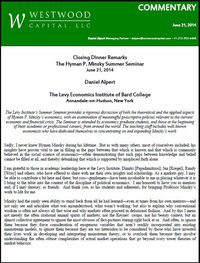What Would Minsky See Today?
Closing Dinner Remarks at The Hyman P. Minsky Summer Seminar
Policy Paper

June 21, 2014
Economist Hyman Minsky had the rare ability to stand back from conventional wisdom and see beyond the current market’s irrationality. In the closing dinner remarks at the Levy Economic Institute’s Hyman P. Minsky Summer Seminar, Daniel Alpert, a founding member of the World Economic Roundtable and author of “The Age of Oversupply: Confronting the Greatest Challenge to the Global Economy,” took up the question “What would Minsky see today”?
Alpert answers that question by explaining why the Federal Reserve’s program of quantative easing has not produced a durable economic recovery and why the economy still leans toward deflation instead of inflation. QE was successful in reflating financial asset prices, Alpert notes, but its impact on the real economy was far less than what one would have expected from such a massive expansion in the quantity of money. Why? Because, Alpert argues, secular price changes are not principally “the result of changes in the quantity of money, but rather the consequence of the relationship between aggregate demand and aggregate supply.” And the world economy continues to suffer from a serious imbalance between too much supply and too little demand.
The result has been a wealth-driven recovery, and wealth-driven recoveries by their nature are weak and unsustainable. Alpert explains: “One of the most obvious reasons why wealth effect-reliant demand is unsustainable is that the inflated price of equities influences the consumption patterns of only a small, but very wealthy, number of consumers. A more disturbing reason is that in an age in which real wages are not growing, the wealth effect has been transmitting to consumers…chiefly by means of rising consumer debt.”